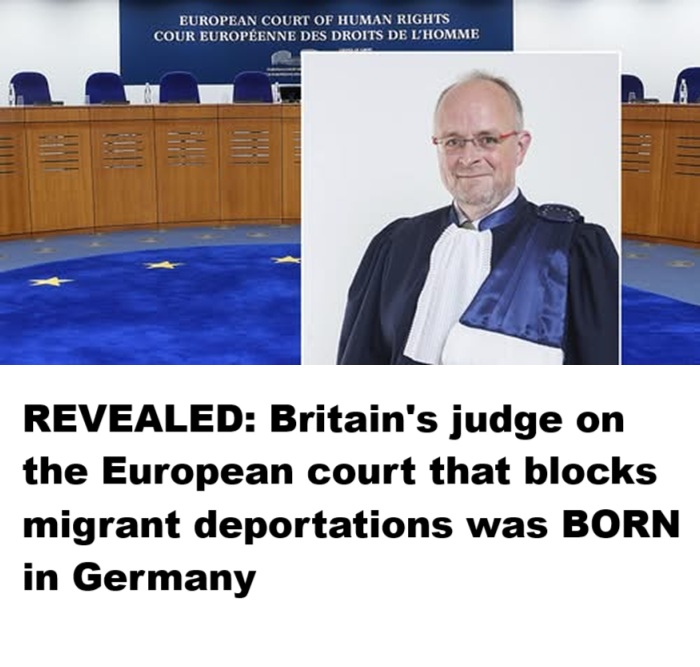The UK’s sitting judge at the European Court of Human Rights (ECHR) is half-British and half-German.
The little-known insight comes amid growing calls for Britain to leave the Strasbourg court to facilitate the deportation of illegal migrants crossing the English Channel.
The UK, having signed and ratified the Convention in 1950 and 1951, respectively, is bound by its provisions. Under the ECHR’s Article 8, migrant criminals have been allowed to stay in the UK because their children would not eat foreign chicken nuggets, and because they would be left feeling “depressed” in their homelands.

Britain’s judge on the European court that blocks migrant deportations was born in Germany
GettyImages/X
The current term of Tim Eicke KC formally ends on 11 September 2025, and he must therefore be replaced if the UK is to stay in this European institution.
Court documents show he was born in Hannover in Germany in 1966, and studied German law at the University of Passau in the south-east of the country, graduating in 1988. He then studied Scots and English law at the University of Dundee.
A barrister since 1993, and a QC since 2011, he was appointed a judge of the ECHR in 2016 – the same year Britain voted to leave the EU.
Although this is surprising, it does not in any way suggest that Judge Eicke’s half-German nationality has influenced his judicial decisions.
Judge Reike is quite clearly a very experienced human rights lawyer. For the last 25 years, he has been the Editor of the prestigious ‘European Human Rights Reports’ publication.
He was previously an independent expert for the Council of Europe in a process establishing its Protocols on the Protection of Refugees, Asylum-Seekers and Displaced Persons.
He has also been very involved in voluntary work, as a volunteer, trustee and/or director of two prominent UK-based human rights NGOs.
What’s more, although a judge at the ECHR must be a national of the country they are elected to represent, they must not, under any circumstances, promote their country’s interests.
How the selection process works
According to Article 22 of the ECHR, each of the 46 member states of the Council of Europe nominates three candidates for a judge position, and these candidates must be nationals of that state.
The Parliamentary Assembly of the Council of Europe then elects one judge per country from these lists. This ensures that each member state has one judge on the Court, reflecting the principle of geographic diversity while maintaining judicial independence, as judges serve in their individual capacity and not as representatives of their state’s interests.
These judges can come from a variety of backgrounds: they can be judges in their home state or be legal practitioners, senior academic lawyers, legal advisers or other government officials with relevant experience.
An official ECHR document states the appointed judge must be of ‘high moral character’ and possess ‘unquestionable qualifications for the exercise of a high judicial function on the international plane’.
This includes knowledge of international law and of the relevant national legal system, as well as proficiency in either English or French, the official languages of the Council of Europe.

Judges from countries with poor human rights records have been able to sit in judgement on cases against the United Kingdom’s alleged human rights violations
Facts4EU
What human rights record?
A legitimate cause for concern is how a Russian judge could rule on human rights violations in the UK right up until the invasion of Ukraine.
Russia has long been a pariah state, violating other nations’ territories (eg Crimea, Chechnya, Ukraine) in contravention of international law, and yet it continued to be a member of the European Council and have a judge on the ECHR until March 2022.
Russia has now been expelled, but as the graph above shows, you could still come up before judges with poor human rights records.
For years, these judges have been able to sit in judgement on cases against the United Kingdom’s alleged human rights violations.
The rankings of each country come from the Freedom in the World annual survey, which has been going for over 50 years, and are for this year (2025). They measure the degree of various civil liberties and rights in each country and rank them overall from 1 to 194.
